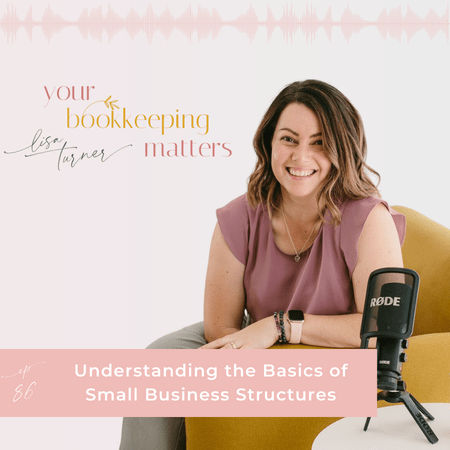#86 Understanding the Basics of Small Business Structures

Today, we’re going to dive into a fundamental aspect of running a small business in Australia – understanding business structures. The structure you choose will define how your business is organised, how it’s managed, and of course, taxed.
Choosing the wrong structure can cause headaches down the road, so it’s important to be informed before making a decision. If you have made the wrong decision, though, don’t panic! I’ve been there myself, and while it costs some time and money, you can definitely change structures.
So whether you are starting a new business or reassessing your current structure, this episode will help you pick the perfect structure for you. Let’s dive in to Australia’s three main types of small business structures:
1. Sole Trader
The sole trader structure is the most common choice for small business owners in Australia. It is cost-effective and easy to set up, making it an attractive option for those starting out on their own. In this structure, you, as an individual, are the business. This means there is no separation between your personal and business entities.
While being a sole trader offers simplicity and full control over decision-making, it also comes with unlimited liability. Without any separation, you are personally responsible for all aspects of the business, including all its debts. Additionally, all the profits of the business will be taxed as your income.
2. Company
The company structure provides a separate legal entity for your business. This means the business enters into contracts, buys assets, and incurs liabilities in its own name, which offers some liability protection for the owners.
This is a great choice for businesses with multiple owners, significant assets, or plans for substantial growth. However, setting up a company requires a formal structure, which comes with more administrative tasks and costs. Don’t get discouraged though! A good tax specialist will be able to step you through this process if it’s the right one for you.
3. Trust
A trust is a unique business structure that holds assets on behalf of beneficiaries. It is not a separate legal entity but a relationship wherein a trustee manages the assets for the beneficiaries. Trusts are known for their flexibility in income distribution and asset protection, making them a common choice for family businesses. Keep in mind that setting up a trust is typically more complex and costly than other structures, so you’ll definitely want professional guidance.
BLOGS MENTIONED:
The Price You Pay for Unreliable Business Guidance on Social Media
HELPFUL RESOURCES:
- Grab the free pricing calculator here
- Join the waitlist for The Bookkeeping Matters Blueprint here
- Join my Numbers List for small business news, fun & helpful tips here
- Grab some FREE Resources here
- Check out my blog here
Connect with Lisa Turner:
Instagram: @accountedforyou
Email: info@accountedforyou.com.au
Website: https://accountedforyou.com.au
rate, review & follow
IF YOU LOVE THE SHOW, COULD YOU PLEASE DO ME A FAVOUR?
Pop over and give it a quick rating and review – it helps me support more ecommerce businesses, creatives and entrepreneurs, like yourself! Super easy click here, scroll down and tap to rate 5 stars and then jot down a quick review. I always love hearing your thoughts and what you enjoyed the most.
And of course, don’t miss out on future episodes – hit the Subscribe or Follow button to stay in the loop with each new weekly episode!






